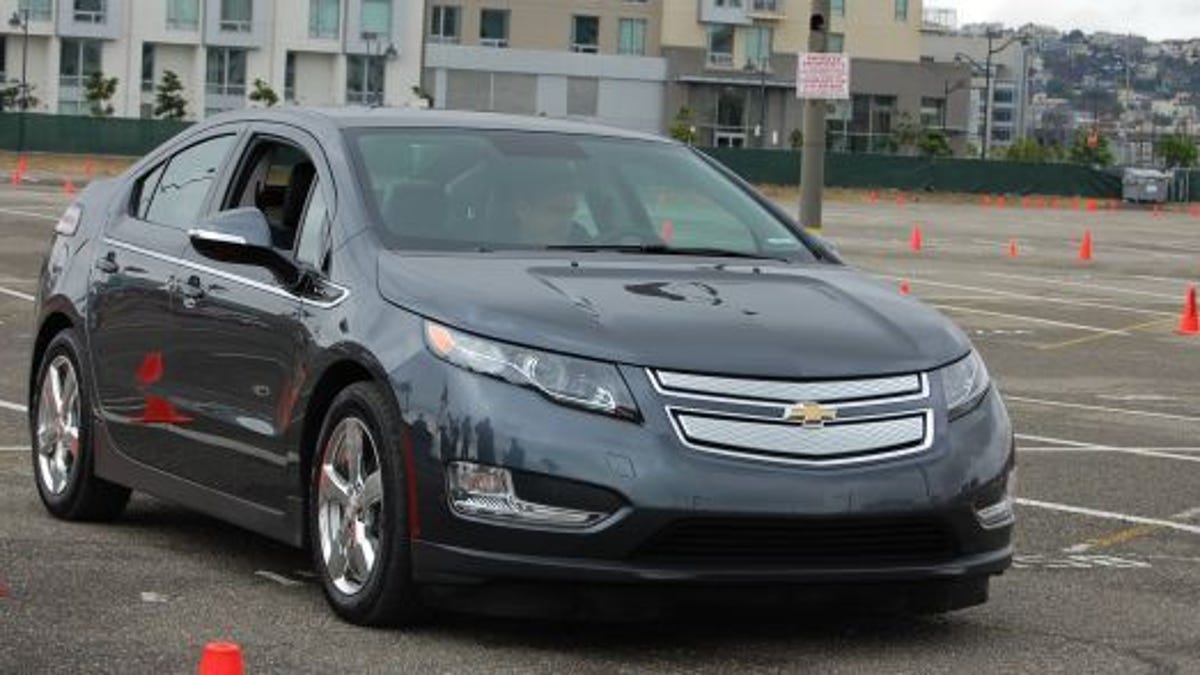The key EV question: Batteries alone, or a gasoline engine, too?
Automotive News reports on electric vehicle range and architecture in new models.

DETROIT--As the era of the electrified car shifts into second gear, a central question looms:
Can electric vehicles gain mass acceptance despite their limited range? Or must electric cars have gasoline range-extenders so the car can meet all its owner's needs?
And Nissan, BMW, and General Motors have different approaches to that crucial issue. BMW's Rich Steinberg says drivers find they love the electric Mini E, whose 100-mile range handles nearly all daily driving needs.
But at GM, Micky Bly, approaching the launch of the Chevrolet Volt plug-in hybrid, says automakers must go beyond early adopters and sell a car that can handle the weekend trip as well as the daily commute.
"I feel strongly the early-adopter movement is done in North America," Bly, GM's executive director for global electrical systems, hybrids, electric vehicles and batteries, told the Automotive News Green Car Conference/Exhibition here last week. The early-adopters market soon will be sated in Asia and Europe, too, he said.
Bly is in charge of the Volt, which is scheduled to arrive in October or November. He touts the Volt's gasoline generator as the way to attract mainstream buyers. If there were any doubt about GM's position, Bly's presentation included a slide saying: "The mass market EV has to be CAPABLE of being your primary vehicle."
"I think pure battery electric vehicles--they're not going to be niche vehicles, but they're not going to be a primary vehicle," Bly said in an interview.
By contrast, Nissan says its first-generation electric Leaf, to be launched late this year, will hit the mass market fast.
Rich Steinberg, manager of electric-vehicle operations and strategy at BMW North America, says most drivers in BMW's Mini E electric vehicle test fleet say they can handle daily driving without worry--and they love not going to a gas station. Most recharging occurs at home.
The additional cost and complexity of range-extended vehicles eventually will turn off buyers, he says. EV owners will realize that they can do their typical daily driving without running low of juice.
"I think with time, when people live with the car on a day-to-day basis and they realize 'I'm not visiting the gas station more than three times a year,' they're going to decide: 'Why did I invest in that gasoline engine when I'm not really going to use it?'" Steinberg said.
'Zero emissions'
Brian Carolin, senior vice president for sales and marketing at Nissan North America, says Nissan someday might offer range-extended electric vehicles. But he says Nissan's strategy with the Leaf EV is to maximize environmental benefits.
"For us, the important thing about the Leaf was to have a unique proposition: zero emissions," Carolin said. "You can't get better than that."
With the industry on the verge of two high-profile product introductions--the Leaf and the Volt-- conference participants were eager to see how consumers react.
Nancy Gioia, director of global electrification for Ford Motor Co., says that by 2020, 10 to 25 percent of the automaker's global sales volume will be a hybrid, plug-in hybrid or pure-electric vehicle.
Demand is uncertain because the technology is changing rapidly. For example, the range of electric vehicles could grow in five years, she says, and consumer acceptance of hybrids and electrics is a work in progress.
Few people are willing to accept "trade-offs in performance and price, she said. Ninety percent are willing to pay a bit more for an electric."
Asked if electrified vehicles need distinctive styling to sell, Gioia said early adopters like different styling. But once the market for electrics reaches 1 to 2 percent of the market, that distinctive look will be less important
The Smart trap
In conversations on the sidelines of the conference, attendees repeatedly brought up the experience of the Smart minicar and early adopters.
At its launch in early 2008, the Smart drew a large number of hand-raisers, consumers who indicated they wanted to buy one. Smart used the same $99 advance-order system that Nissan is using for the Leaf. But once the backlog of orders began to wind down and some of those intenders passed on the chance to buy the car, sales tumbled.
Through May, Smart's U.S. sales this year are down 63 percent to 2,772 units. The conventional wisdom is that Smart attracted early adopters but has been unable to widen its appeal.
In contrast to the debate over the size of the market for EVs, conference speakers broadly agreed that the price of batteries for electrified vehicles--whether electrics, hybrids, or plug-in hybrids--will continue to fall, and that battery power and range will increase.
Cutting battery cost is the foremost route to lowering the cost of electrified vehicles, Bly says. He says GM is using first-generation vehicle-specific lithium ion batteries in the Volt but already is developing third-generation batteries.
GM is using more battery than it needs in the Volt because performance will deteriorate over the vehicle's life, he said. In addition, EV batteries are engineered to use some, but not all, of capacity because fully discharging a battery shortens its usable life. Broadening the usable portion of a battery's capacity is one way to lower cost.
Prabakhar Patil, CEO of battery maker Compact Power, said, "If you can widen that range, you get more out of each battery." Bly recalls that three years ago, when GM asked battery makers to widen the batteries' usable range, "every supplier was cringing."
"Now they're bringing in more of that bandwidth," he said.
Meanwhile automakers are placing their bets on the right electric architecture to appeal to the consumer. The Volt-Leaf showdown will start to answer the question. And perhaps they both can win.
Asked about the Leaf, GM's Bly said: "It's exciting. We need that sort of competition. "I'll be glad to see it launch one day after mine.
(Source: Automotive News)